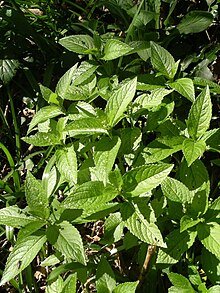Dog's mercury
| Dog's mercury | |
|---|---|
 |
|
| Scientific classification | |
| Kingdom: | Plantae |
| (unranked): | Angiosperms |
| (unranked): | Eudicots |
| (unranked): | Rosids |
| Order: | Malpighiales |
| Family: | Euphorbiaceae |
| Genus: | Mercurialis |
| Species: | M. perennis |
| Binomial name | |
|
Mercurialis perennis L. |
|
Mercurialis perennis, commonly known as dog's mercury, is a woodland plant found in much of Europe as well as in Algeria, Iran, Turkey, and the Caucasus, but almost absent from Ireland, Orkney and Shetland. A member of the spurge family (Euphorbiaceae), it is a herbaceous, downy perennial with erect stems bearing simple, serrate leaves. The dioecious inflorescences are green, bearing inconspicuous flowers in March and April. It characteristically forms dense, extensive carpets on the floor of woodlands and beneath hedgerows.
Dog's mercury favours alkaline (basic) soils and can be found in abundance in suitable habitats in limestone regions. It also occurs widely on neutral soils, but is absent from acidic ones. Spreading by underground rhizomes, it thrives in deep shade or semi-shade, where its dense growth may shade out other woodland flowers such as oxlip, fly orchid, and even young ash seedlings, but in the open it eventually gives way to other plants.
Although it is strongly associated with land that has had a long continuity of woodland or shrub cover, and only rarely occurs in extensive areas of secondary woodland, it is nevertheless able to colonise new deciduous woods on dry, calcareous soils at an annual rate of a metre or more.
Existing colonies in some parts of Britain (including some in woods on boulder clay in East Anglia), are expanding and showing increased vigour, perhaps as a result of deeper shade in woodlands where coppicing has ceased.
The plant's common name derives from the plant's resemblance to the unrelated Chenopodium bonus-henricus (Good King Henry, also known as mercury, markry, markery, Lincolnshire spinach). Since Mercurialis perennis is highly poisonous, it was named "dog's" mercury (in the sense of "false" or "bad"). It has also been known as boggard posy.
...
Wikipedia
